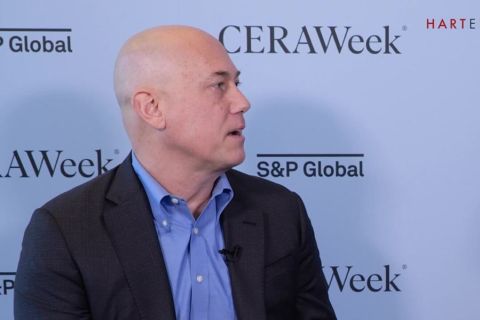Recent discoveries of fossil fuel reserves in the ultra-deepwater Santos, Campos, and Espirito Santo basins have opened a new frontier for Brazil’s oil and gas industry. Based on results of more than 30 exploratory wells, presalt reservoirs are predicted to be of a magnitude of 50 Bbbl to 100 Bbbl or more. This discovery has established a new status for Brazil in the international oil and gas market, expanding its proven reserves and doubling its production capacity. Investments of more than US $250 billion in the presalt fields are scheduled to be made by 2020.
As with any new opportunity, there are challenges to overcome in connection with the development of these vast reserves. At the outset, there are significant logistical and infrastructure demands to be met. For example, processing and transportation systems must be developed to serve oil and natural gas production at distances of nearly 300 km (200 miles) from shore. Toward that end, Petrobras is currently studying and analyzing options such as support bases, ocean terminals, and remote operation centers.
Although Brazil’s oil and gas resources offer attractive inbound investment opportunities, certain hurdles remain to achieve success. Ernst & Young member firms have assisted a variety of investors and companies in connection with investments into the presalt fields and have identified three key issues that deserve significant consideration and planning.
1. Labor arrangements;
2. Navigating tax and regulatory regimes; and
3. Meeting local content requirements and containing costs.
Skilled labor
One of Brazil’s major bottlenecks is the shortage of skilled labor. The number of technicians and engineers in Brazil is not enough to cope with increasing labor needs created by the presalt opportunity. Foreign workers face problems when applying for work visas and may encounter tax issues, such as taxation by multiple countries, as they work in Brazil.
Successful companies have adopted plans for training in-country teams and transferring corporate knowledge effectively. To tackle the potential double taxation burden for expatriates, companies should carefully analyze and plan for the transfer of personnel beforehand, anticipating business needs. When the opportunity to prospectively plan for the movement of personnel is not feasible, many employers typically put in place and follow “tax equalization” policies or certain other tax protection mechanisms. Under any scenario, the impact of Brazilian taxes (corporate, transfer tax, and others), as well as potential taxes that could be imposed by other jurisdictions, should be carefully considered and factored into the overall project cost.
Tax and regulatory uncertainties
Another key issue with investing in Brazil is the impact (and potential uncertainty) of Brazil’s indirect taxes. For example, under current Brazilian law, a state tax on goods and services (ICMS), which is roughly equivalent to a traditional value-added tax, can apply to certain activities in Brazil. Specifically with respect to the ICMS, however, the lack of detail and consistency in the application of current legislation leaves companies ill-equipped to maximize potential tax credits.
Such uncertainty (in both impact and application) reinforces the demand for risk management and sound fiscal guidance as a way to maximize the value of invest- ments and provide assurance to investors. It is crucial that companies operating in Brazil are fully apprised of and can comply with the applicable rules to avoid potential tax contingencies.
Local content and cost
Brazil has recently enacted legislation effectively requiring the use of local goods and services. The requirements of these newly established “local content” laws, which are primarily aimed at generating economic stimulus in Brazil, have enhanced concerns among oil and gas companies about the ability of domestic suppliers to meet demand and compete on price and quality in an international marketplace. Quotas for domestically produced supplies and equipment, as well as domestic services, can ultimately result in additional short-term costs – whether due to the absence of economies of scale among the suppliers, the need to dilute the investment by expanding local production, or the need to amortize the R&D necessary to develop solutions for presalt operations.
In addition to the potential incremental costs to oil and gas operators of compliance with the local content laws, Brazil’s oil and gas industry faces clear signs of inflationary pressures due, in part, to the rise in price for certain commodities such as steel, which has increased the cost of the main assets associated with significant capital projects. To mitigate risks with respect to profitability, companies should analyze and optimize personnel and administrative costs, logistics costs, and resource sharing, as well as consider the use of a shared service center.
Labor arrangements, navigating Brazil’s tax and regulatory framework, and the requirement to meet local content requirements represent pressing issues facing oil and gas operators in Brazil today; however, with the right guidance and proper planning, none are insurmountable. Properly structured, the recent discoveries in Brazil offer an extraordinary opportunity for foreign investors.
The views expressed herein are those of the author and do not necessarily reflect the views of Ernst & Young LLP.
Recommended Reading
Defeating the ‘Four Horsemen’ of Flow Assurance
2024-04-18 - Service companies combine processes and techniques to mitigate the impact of paraffin, asphaltenes, hydrates and scale on production—and keep the cash flowing.
Tech Trends: AI Increasing Data Center Demand for Energy
2024-04-16 - In this month’s Tech Trends, new technologies equipped with artificial intelligence take the forefront, as they assist with safety and seismic fault detection. Also, independent contractor Stena Drilling begins upgrades for their Evolution drillship.
AVEVA: Immersive Tech, Augmented Reality and What’s New in the Cloud
2024-04-15 - Rob McGreevy, AVEVA’s chief product officer, talks about technology advancements that give employees on the job training without any of the risks.
Lift-off: How AI is Boosting Field and Employee Productivity
2024-04-12 - From data extraction to well optimization, the oil and gas industry embraces AI.
AI Poised to Break Out of its Oilfield Niche
2024-04-11 - At the AI in Oil & Gas Conference in Houston, experts talked up the benefits artificial intelligence can provide to the downstream, midstream and upstream sectors, while assuring the audience humans will still run the show.





